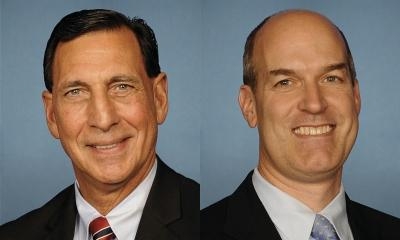Fri, Dec 06, 2013
Legislation Designed To Ensure An Open Rulemaking Process In Changing Medical Requirements
The U.S. House Transportation Committee on Wednesday approved bipartisan legislation (H.R. 3578) to ensure the FAA conducts an open rulemaking process before making changes to medical certification requirements for pilots with sleep disorders.

“Safety remains my and the subcommittee’s top priority. While sleep apnea has never been identified as a primary cause or contributing factor of an aviation accident, health issues can arise unexpectedly which is why I have always supported reasonable, effective, and proactive efforts to improve aviation safety,” said Chairman Frank LoBiondo (R-NJ) (pictured, left). “Should a revision to existing policies on sleep disorders be warranted, then the FAA should engage in an open rulemaking process to ensure all viewpoints, including those of medical experts, are heard and carefully considered.”
“When it comes to flying, safety is my top priority,” Ranking Member Rick Larsen (D-WA) (pictured, right) said. “The FAA needs to address the issue of sleep apnea in an open and transparent way that lets all stakeholders and safety experts provide input. I thank Chairman LoBiondo for his leadership on this issue and I look forward to working with the FAA, pilots, airlines and others to continue making flying safer.”
Current FAA requirements dictate a pilot or air traffic controller diagnosed with sleep apnea to report their condition and seek treatment. The Aviation Medical Examiners Guide – a comprehensive document detailing the FAA’s medical certification regulations, dispositions, and protocols – includes an established process that provides the FAA with the authority to issue or re-issue an airman medical certificate to an applicant that is diagnosed with sleep apnea. After a review process, the FAA ultimately decides whether or not to issue a medical certificate.
In November, FAA officials announced their intent to subject all pilots with a body mass index (BMI) of 40 or more - who might be at risk of having a sleep disorder even in the absence of any clinical evidence - to potentially expensive testing and evaluation. The FAA also indicated their intention to eventually broaden this policy to apply to air traffic controllers and possibly to pilots with a lower BMI. The LoBiondo-Larsen legislation approved today does not prohibit the FAA from implementing new medical certification requirements for sleep apnea. It does, however, require the agency to conduct an open rulemaking process if they choose to propose new sleep disorder requirements.
Modeled after similar legislation (H.R. 3095) signed into law on October 15th affecting commercial truck drivers, H.R. 3578, introduced by LoBiondo and Larsen with Representatives Larry Bucshon (IN-08), Daniel Lipinski (IL-03) and Sam Graves (MO-06) as original cosponsors, was marked up and approved by the House Committee on Transportation & Infrastructure today. It now heads to the full House for consideration.
More News
Also: Horizon Picks P&W PT6A, Army Buys 3 EagleNXT, First Hybrid-Electric Regional, Army Selects AEVEX Anduril Industries’ YFQ-44A Collaborative Combat Aircraft was flown>[...]
While Flying North Along The Beach At About 300 Ft Above Ground Level, The Pilot Reported That The Engine RPM Dropped To About Idle On September 28, 2025, at 1126 eastern daylight >[...]
Aero Linx: European Association of Aviation Training and Educational Organisations (EATEO) Welcome to the “ European Association of Aviation Training and Education Organizati>[...]
On-Course Indication An indication on an instrument, which provides the pilot a visual means of determining that the aircraft is located on the centerline of a given navigational t>[...]
“It also gives us the hard data we need to shape requirements, reduce risk, and ensure the CCA program delivers combat capability on a pace and scale that keeps us ahead of t>[...]
 Airborne-NextGen 11.04.25: Anduril YFQ-44A, Merlin SOI 2, UAV Rulemaking Stalled
Airborne-NextGen 11.04.25: Anduril YFQ-44A, Merlin SOI 2, UAV Rulemaking Stalled NTSB Prelim: Elmore Travis C Searey
NTSB Prelim: Elmore Travis C Searey ANN's Daily Aero-Linx (11.03.25)
ANN's Daily Aero-Linx (11.03.25) ANN's Daily Aero-Term (11.03.25): On-Course Indication
ANN's Daily Aero-Term (11.03.25): On-Course Indication Aero-News: Quote of the Day (11.03.25)
Aero-News: Quote of the Day (11.03.25)



